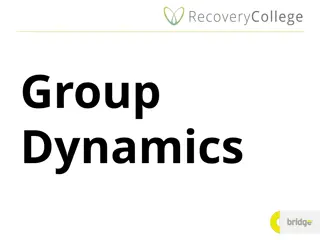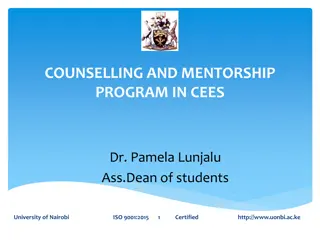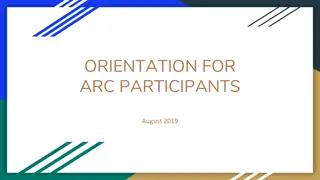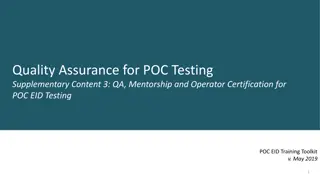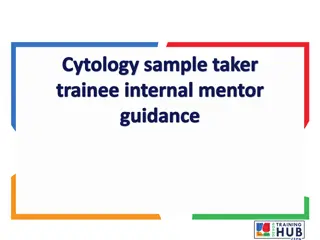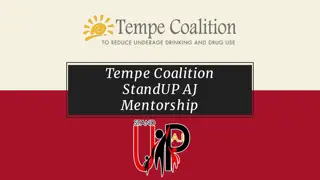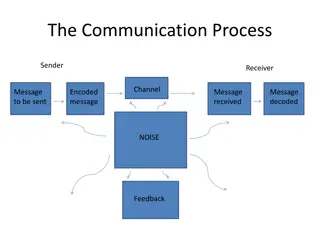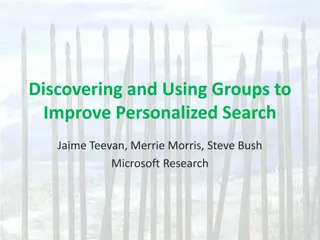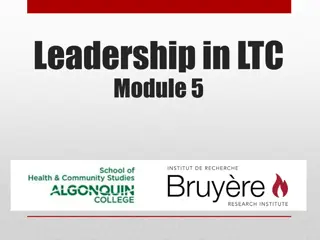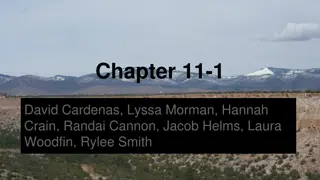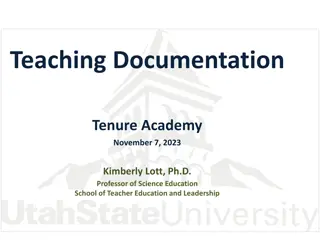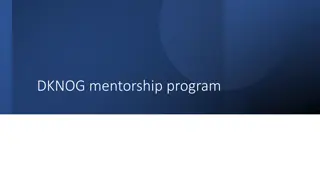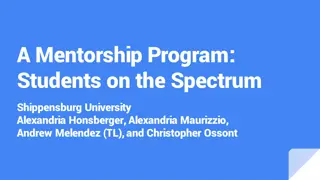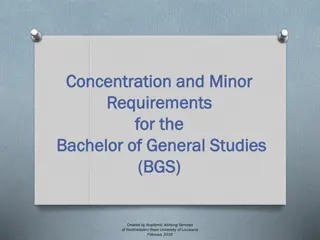BGS Mentorship Workshop: Enhancing Communication and Group Dynamics
The BGS Mentorship Workshop held by BGSA on August 18th, 2020, focused on improving listening skills, communication, and group dynamics among participants. The itinerary included activities such as case studies, a mentorship panel, and small group breakout sessions. Participants were guided to identify constructive and deconstructive group behaviors to foster better collaboration. Overall, the workshop aimed to enhance interpersonal skills and create a conducive environment for mentorship and learning.
Download Presentation

Please find below an Image/Link to download the presentation.
The content on the website is provided AS IS for your information and personal use only. It may not be sold, licensed, or shared on other websites without obtaining consent from the author.If you encounter any issues during the download, it is possible that the publisher has removed the file from their server.
You are allowed to download the files provided on this website for personal or commercial use, subject to the condition that they are used lawfully. All files are the property of their respective owners.
The content on the website is provided AS IS for your information and personal use only. It may not be sold, licensed, or shared on other websites without obtaining consent from the author.
E N D
Presentation Transcript
BGS Mentorship Workshop By BGSA August 18th 2020
Mentorship Workshop Itinerary Timeline Activity Leader(s) 2:00-2:05 Overview of Program Gabriela 2:05-2:30 Listening Skills & Enhancing Communication Student Volunteers 2:30-3:30 Case Studies (15 minutes each) Student Volunteers --- 3:30-3:35 Bathroom & Stretch Break 3:35-4:05 Mentorship Panel of Current PhD Students Mentor Panel 4:05-4:10 Concluding Remarks Gabriela Large Group Session Small Group Session Key:
Transition to Small Break Out Sessions 9-10 participants per group 1 moderator (Thank you AV Team!)
Listening Skills & Enhancing Communication 1. Take a few minutes to identify your Constructive and Deconstructive behaviors 2. Introduce yourself by sharing the following: a. Name b. BGS program c. Career/Research interests d. Something about yourself (hobby, fact, new/unique skill) e. Constructive/Destructive behavior (following slides will guide you) 3. Before you start state the name of the person before you and their constructive behavior. a. Ex: It is nice to meet you Laura. I admire that you are a harmonizer.
Identify your Constructive Group Behavior Cooperating: Is interested in the views and perspectives of other group members and willing to adapt for the good of the group. Clarifying: Makes issues clear for the group by listening, summarizing, and focusing discussions. Inspiring: Enlivens the group, encourages participation and progress. Harmonizing: Encourages group cohesion and collaboration. For example, uses humor as relief after a particularly difficult discussion. Risk Taking: Is willing to risk possible personal loss or embarrassment for success of the overall group or project. Process Checking: Questions the group on process issues such as agenda, time frames, discussion topics, decision methods, use of information, etc.
Identify your Deconstructive Group Behavior Dominating: Uses most of the meeting time to express personal views and opinions. Tries to take control by use of power, time, etc. Rushing: Encourages the group to move on before task is complete. Gets tired of listening to others and working with the group. Withdrawing: Removes self from discussions or decision making. Refuses to participate. Discounting: Disregards or minimizes group or individual ideas or suggestions. Severe discounting behavior includes insults, which are often in the form of jokes. Digressing: Rambles, tells stories, and takes group away from primary purpose. Blocking: Impedes group progress by obstructing all ideas and suggestions. "That will never work because..."
Listening Skills & Enhancing Communication 1. Now that you have identified your Predominant Constructive and Deconstructive Behaviors, keep each other accountable and involved! 2. Introduce yourself by sharing the following: a. Name b. Career/Research interests c. Something about yourself (hobby, fact, new/unique skill) d. Constructive/Destructive behavior (refer to previous slides for guidance) 3. Before you start state the name of the person before you and their constructive behavior. a. Ex: It is nice to meet you Laura. I admire that you are a harmonizer.
Case Studies These case studies were chosen to initiate conversations about mentoring between students, faculty, and your future thesis mentor(s). You do not need to answer every question, these are merely to start conversation and discussion.
Request for Student Volunteers: 1. Time Keeper - Someone to check the time and remind the group when it is time to move onto the next case study 2. Note Taker - someone to write down questions to submit to mentorship panel, that are not answered or addressed during the case study discussions
Case Study 1: Finding a Mentor Alicia is a first year student who has rotated in multiple labs. She did not take much time interviewing the PI or lab prior to her rotations, and regrets it deeply. Her first rotation mentor had multiple rotation students, but only accepts one student a year and has filled the position. Her second rotation PI let her know that she does not have the space for her to join the lab after she completed her rotation. She is still in the midst of her third rotation and is concerned that the lab has a toxic work environment since research projects are valued over the people in the lab. She suspects this because everyone works long hours in the lab and when she went to grab coffee with the fourth year graduate student in the lab, they mentioned that they felt burnt out. Alicia is concerned that she has not found an appropriate thesis lab nor PI mentor, and that she has to join her third rotation lab. She is not sure what to do since she was supposed to join her thesis lab by the June deadline. Guiding Questions: Should Alicia have asked about funding and open spots in the lab prior to her rotations? Who could Alicia have contacted prior to her rotations to learn more about the work environment in the lab and the mentors? What are some important things to consider when looking for a thesis lab? How can you prioritize these items when meeting with potential rotation PIs and labs? What are Alicia s options now? Who can she contact to discuss her options? [Suggested answers are in the notes for reference.]
Case Study 2: Aligning Expectations Guiding Questions: How often should you meet with your rotation PI? What about your thesis advisor? Do you think this mentor has trouble aligning expectations with other members of the lab? If so, why? How can you notice this as a potential issue in the future? How can you align expectations with your rotation PI? Will this be different with your thesis advisor, or similar? Who else can you ask for mentorship and guidance in the lab besides your PI? Do you think mentoring-up by creating an agenda for your 1:1 meetings would be helpful for future meetings? If so, what would you include in this agenda? During your rotation you noticed that you haven t met with your PI yet, besides meeting them on your first day in the lab. When you ask people in your lab if this is usual for graduate students they say it is abnormal, and that they typically meet with graduate students who have joined the lab more frequently. However, when you ask one of the graduate students in the lab they say it is normal to meet with their PI only every few months. When you finally do meet with your PI, they ask you for an agenda and to see your results and lab notebook, but you were not aware you should have made an agenda or brought these items to the meeting. Your meeting was scheduled to be 30 minutes, but only lasted 10 minutes due to your PI s frustration. You are very confused, as no one in the lab warned you about this and these expectations were not discussed previously to this meeting. [Suggested answers are in the notes for reference.]
Case Study 3: Effective Communication When you meet with your PI, they often talk very quickly and you miss components of your newly developing project that are important to know and understand to start to think independently about your project. This requires them to repeat themselves throughout the meeting and at the subsequent meetings. They are starting to get frustrated with you, since they have to keep repeating themselves. To add to the frustration, you are also getting irritable. After emailing your PI multiple times without response, you find out that they have been using slack with the rest of the lab, but they did not properly add you to the slack channel. Then, they mention that the individuals in the lab have the protocols in their virtual lab notebooks, but you have not been able to find any of them typed up online. Instead, you have to ask the lab members directly to see their lab notebook protocols, which is not what the PI expects of them in the lab based on your previous discussions. Guiding Questions: What can you do to make sure you are assessing your own understanding of what is happening in these meetings? What resources can you ask your PI to provide to you to learn and understand this information that is pertinent to your project that they are speaking about during your meetings? When should you discuss communication preferences with your PI? How can you improve communication with your PI? Whose responsibility is it to ensure there is effective communication in the lab? [Suggested answers are in the notes for reference.]
Case Study 4: Mentoring Philosophy and Plan Guiding Questions: What is a Mentoring Philosophy and Plan? When should you discuss this with a PI? Was this an appropriate time to discuss this? Should a Mentoring Plan be adapted to each graduate student? If so, how can you help your advisor figure out what mentoring style works best for you? Would your Individual Development Plan (IDP) be a good place to start developing a mentoring plan with your PI? If not, what else could you try or use? Will your PI s mentoring philosophy change throughout your training? Will your mentoring plan change throughout your training? What are the different types of mentoring styles? Which one works best for you? If you do not know, how can you figure this out? Prior to joining your thesis lab you meet with one of your rotation PI s to discuss joining their lab. You have already discussed funding and space in the lab, and they are open to having you join. After your meeting you talk to one of your peers about how well your meeting went, and they ask if you talked about the PI s mentoring philosophy and plan. You have no idea what your friend is talking about. You haven t even figured out what mentoring style best suits you, or if they have a mentoring plan nor if that mentoring plan would work well for you. [Suggested answers are in the notes for reference.]
Transition to Large Group Session We will resume our large group session at 3:30 PM. Finished early? Answer some student questions! Didn t finish? Don t worry, this is about discussing and learning. (Thank you AV Team!)
Bathroom & Stretch Break You deserve a break for your hard work. We will reconvene at 3:35 PM.
Mentoring Panel: Choosing a Mentor and the Mentor- Mentee Relationship Sent in Questions (20 min) Open Question and Answer to follow (10 min)
Mentoring Panel Brief Introductions Moderator: Lindsay Roth, Jordan-Sciutto & Grinspan Labs, 6th year (rothlind@pennmedicine.upenn.edu) Format: The moderator will state the question to be answered and then one panelist will answer each question. If a panelist has any additional information or advice, they may add on if time allows. Panelists: 1. 2. 3. 4. 5. 6. 7. Laura Ohl (CAMB/GTV), Akizu Lab, 3rd Year, Laura.Ohl@pennmedicine.upenn.edu Rina Kim (IGG), Vonderheide Lab, 4th Year, rinakim@pennmedicine.upenn.edu Kahea Uehara (BMB), Titchenell Lab, 4th Year, ueharak@pennmedicine.upenn.edu Monika Eiva (CAMB/CB), Powell lab, 6th Year, monsta@pennmedicine.upenn.edu Gabriela Witek (PGG), Moss Lab, 5th Year, gwitek@pennmedicine.upenn.edu Kuldeep Yadav (GGEB), BeSAFIR Lab, 2nd Year, kyadav@pennmedicine.upenn.edu Pankhuri Singhal (CAMB/G&E), Ritchie Lab, 4th Year, singhalp@pennmedicine.upenn.edu
Mentoring Panel (Submitted Questions; 20 min) Rotations: What did you consider when choosing a rotation lab? What questions should I ask to gauge mentorship style? What are the "red flags" when I am in a rotation lab or meeting with a potential mentor? What should you do after a rotation? How do you tell your rotation PI(s), that you decided to join another lab? How is COVID affecting rotations, lab time, and joining thesis labs? Choosing a Thesis Mentor: Should I choose lab with a good mentor or a lab with a research project I m interested in? How did you choose your thesis mentor? What criteria did you use? How challenging is it to join a lab without other graduate students? What are the responsibilities of a mentor and mentee in graduate training? What is it like to be co-mentored? What are the pros and cons of this choice? Mentorship: What is the role of a thesis mentor during graduate training? Are they an administrative boss, a scientific advisor, or a personal mentor? Is your thesis PI receptive to suggestions to tailor their mentoring style to your needs? How do you start these conversations to ensure they go well? How have you dealt with a difficult situation with your PI, such as them sharing confidential information with lab, saying something inappropriate, or offending you in some way? How did you overcome or deal with this?
Open Question and Answer Session about Mentorship (10min) Please type your questions into the Bluejeans Chat titled Everyone, and our moderator will announce the question for our panelists to answer.
Thank you to our Student Volunteers! Lindsay Roth - rothlind@pennmedicine.upenn.edu Monika Eiva - monsta@pennmedicine.upenn.edu Rina Kim - rinakim@pennmedicine.upenn.edu Gabriela Witek - gwitek@pennmedicine.upenn.edu Ana Defendini - Ana.Defendini@pennmedicine.upenn.edu Stefan Peterson - stefan22@pennmedicine.upenn.edu Vanessa Fleites - fleitesv@pennmedicine.upenn.edu Pankhuri Singhal - singhalp@pennmedicine.upenn.edu Kahealani Uehara - ueharak@pennmedicine.upenn.edu Janice Reynaga - Janice.Reynaga@pennmedicine.upenn.edu Kuldeep Yadav - kyadav@pennmedicine.upenn.edu Laura Ohl - Laura.Ohl@pennmedicine.upenn.edu If you have any follow up questions about mentoring, please feel free to email them!
Helpful Tools and Resources for Better Mentoring (Will be sent out in follow up email. Please see the following slides in your own time.)
What requirements do I have to fulfill in 1st year? How do I let my mentor know how much time I will be able to contribute to my rotation project? How much time will I need for classes? How do I make sure to have work-life balance?
General Graphical Overview of 1st Year spring semester fall semester summer Required Classes (~15h) Required Classes (~15h) Rotation 1 (~25h) Rotation 2 (~25h) Rotation 3 (~25h) Pre-Dissertation Work (40h) General Graphical Overview of PhD Program 2nd Year 1st Year 3rd Year 4+ Year T32 Grant (June) Elective Classes Pre-dissertation Research Peer Mentoring cont. Preliminary Exams F31 Grant (Aug) Thesis Committee Selection Dissertation Research Presentations: Retreat(s) Symposiums Research in Progress Talks Thesis Committee Meetings Dissertation Research Presentations: Retreat(s) Symposiums Research in Progress Talks Required Courses Rotation Research Rotation Presentations 1st Year Peer Mentoring Programs NSF Grant (October)
How can I become a better Communicator to find the right lab for me? Effective Communication Styles Worksheet
Enhancing Communications Form: Effective_Communication_Styles_Inventory.pdf
Enhancing Communications Likely validating for what you already know May vary under different circumstances Home Work Meant to raise awareness of your go to style Provides language to discuss challenges with mentee
How can I align expectations with my future PI? 1. Alignment Phase Checklist/Questionnaire 2. Mentoring Compacts
Finding Your Ideal Mentor for Graduate Studies Do their research interests align with my own? Leave room for you to explore new interesting areas you may not have considered Will they give you the freedom to find a project you like? What is their mentorship style? What do you need? Would it be ideal for you to have someone hands off or someone who will be at the bench next to you (PI or lab member)? Where in their career are they and does that inform their mentorship style? Ex: senior PI s are busy often, and travel more vs. someone tenure track PI may have more time initially, but also has tenure track obligations Does the lab have current students you can talk to? Are there students who rotated in their lab but did not join that you can talk to? Talk to them! What is the lab culture? Do they collaborate with others in the department, in the field? Do they encourage taking courses or going to conferences? Is there evidence of work-life balance? Do students and staff in the lab seem happy? What is their funding status? Don t be afraid to ask this directly. Do they already have a lot of trainees? Will they be able to focus on you? What is the profile of students who have graduated from their lab? How long was their PhD? What do they do now? Are former students now in academia as well as industry? Are they open to alternative careers besides academia for their trainees?
Mentoring Compacts Description: A written document used to articulate expectations between mentors and mentees Focused on expectations for the working relationship on a daily/ weekly basis Differs from an Individual Development Plan (IDP) which focuses on the mentee s short and long-term career plans Although, this can be used as a starting point for discussions about #labgoals! Rationale: Provides documentation of expectations which can be revisited and revised Serves as a shared reference point for regular progress reviews Makes invisible expectations, visible Levels the playing field among mentees In summary, compacts provides mentors and mentees an opportunity to articulate their expectations and bring them into alignment





